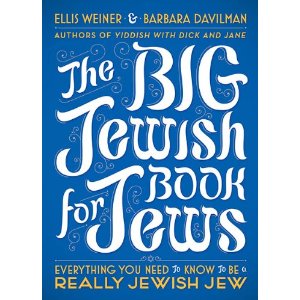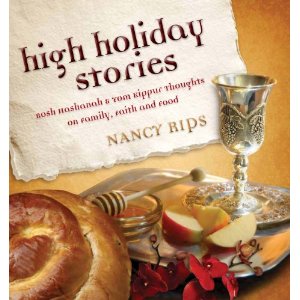 Here’s a question for you: What makes a good Jew? This was a tough one for me.
Here’s a question for you: What makes a good Jew? This was a tough one for me.
That’s why I really wanted to enjoy Ellis Weiner and Barbara Davilmans’ “The Big Jewish Book for Jews: Everything You Need To Know To Be a REALLY JEWISH JEW” (Plume: July 27, 2010 release; $12), which Plume publishing was kind enough to provide us with a copy of. I mean, the back cover alone made my wife and me giggle with recognition, especially with a line like this:
“Today’s Jews need to relearn the old ways so that their cultural identity means something other than laughing knowingly at Curb Your Enthusiasm…”
That’s funny stuff, not to mention, well, true. Many Jews have, in fact, forgotten what it’s like to be a Jew; what it’s like to be Jewish. And as the book points out, watching reruns of Seinfeld doesn’t count. I’m referring more to the idea of practicing Judaism, feeling it.
But if there’s anything I’ve learned, it’s that everyone should—needs!—to go on their own spiritual journey, even if it doesn’t take them directly toward Judaism. You can’t force a feeling. You can’t hang on to a certain belief, if you don’t truly buy into it yourself.
And this is coming from personal experience. I was raised going to a conservative synagogue, and just as Weiner and Davilman point out in their book, a lot of the time, after a boy or girl has his or her Bar or Bat Mitzvah, respectively, they tend to fall off the face of the earth, when it comes to taking part in going to synagogue and/or any other Jewish traditions.
For me, it was pretty much the same thing. From the moment the lights went out at my Bar Mitzvah party, I may has well have said “sayonara” to Judaism, at least, for several years. I began to become skeptical, even cynical about Judaism; questioning different aspects, relating to God, certain traditions, practices, various world events, all by way of asking the age-old questions: Why? What does it all mean? When I didn’t get any particularly solid answers, I just…quit. It took a while to get to where I am now, a practicing Jew that believes in God and has faith that there is something bigger than all of us. Like I said, there is no through-line, and to quote Fleetwood Mac, “you can go your own way.”
And this is why the authors of “The Big Jewish Book for Jews” have written a book that is, for all of its giggle-giggle, chuckle-chuckle moments, completely smug and fiercely condescending toward both the Jewish youth of our generation (for example, my wife and I both rolled our eyes when a passage explaining that Judaism isn’t this trendy club, or, as the authors seem to think the kids of today’s generation put it, “da bomb.” Da Bomb?! Hmmmm….apparently, no one had the heart to tell poor, clearly out-of-touch, Barb and Ellis that the “da Bomb” hasn’t been a part of the vernacular of youngsters and teens alike since the days of The Fresh Prince of Bel-Air. And that show has been off the air for over a decade now!), and, well, every other Jew, or even someone considering conversion.
But most of all, despite whatever intentions—good or bad—the authors had, the book is downright offensive. And not just in an ooh…that’s not cool, man. You shouldn’t say those sorts of things, because it hurt my feelings kind of way. Not by a sight. This is an ugly, offensive book that takes seems to want to be taken seriously, but can’t help but make playful jokes regarding Jewish culture. Every purported Jewish stereotype you can think of, stereotypes that I thought we’d started to get away from—they’re all here.
This book has one thing, and one thing only, going for it (besides being a blessedly short and fast read), in that between the Jew jokes, it actually does have some lessons about High Holy Days, and their importance, such as Yom Kippur, Rosh Hashanah, etc, as well as how to wear tallit, kippot, and tefillin. However, these areas are so bone-dry, that it’s clear that the dynamic duo had no particular interest in writing about them.
And what’s the deal with taking not-so-subtle pot shots at The Way Things Were?! I’m not just talking about this book, in particular, though it’s certainly guilty of doing so, but there’s all this talk about how shows like Mad Men are the best thing since sliced bread.
Well, ya know what? Like this book, I think the show is absolutely smarmy, self-satisfied by the way it makes our generation look so much more swell than those generations of the past. Sorry, people. I hate to burst your bubbles, but, advances in modern technology and the evolution of civil rights aside, we’re no better off than the men and women that came before us. Ya know, before we were glints in our fathers’ fathers’ eyes! These people, Jewish or not, worked their asses off in desperate times—far more than our generation ever could proclaim. And shame on Hollywood or, in this case, the literary world for trying to tear it apart and take away the glory that truly belonged to our ancestors—those great and those from more “modern” times.
Look, I know I’m going on about how awful this book is, and I’ll admit it, I’ve dabbled in playful Jewish self-mockery and–deprecation—many a time in fact.
But to put this crap on book shelves is an affront to Judaism, as we know it.
I may never get a plaque on my wall for being “World’s Greatest Jew” (well, at least, not anytime soon), but I know right from wrong and I have faith in The Almighty. I may not always believe…but I have faith and I try to observe and hold onto that faith, as best I can. And I don’t need some author(s), trying to make a buck with their shitty book, telling me how I can be a better Jew, especially a book that reads more like a Nazi propagandist’s wet dream.
Shameful. Just shameful.
****
 ….Which brings me to a far better examination of Jewish culture. And guess what! It doesn’t tell me how to do a damned thing!
….Which brings me to a far better examination of Jewish culture. And guess what! It doesn’t tell me how to do a damned thing!
Instead, Nancy Rips—whom, in the interest of full disclosure, is a friend of Yours Truly—along with Frederick Fell Publishing, generously mailed me a copy of her terrific, heartfelt new book, “High Holiday Stories: Rosh Hashanah & Yom Kippur Thoughts On Family, Faith and Food.” (Frederick Fell Publishing: Sept. 10, 2010 release; $13)
And the truth of the matter is this: The book, wonderful as it is, is a tough one to review, which is, by no means, a reflection of its quality, but rather, it’s pretty much critic-proof, as it’s a book of quotes; specifically, it a book of local—and some famous—voices, telling their favorite holiday and/or Jewish memories.
Now, obviously, not every story is going to be as interesting or heartwarming as the next one, but for the most part, this is the kind of book that everyone wanting to learn about Jewish culture can read and enjoy.
In fact, some of these stories left me breathless in their ability to convey feelings of love, loss and yes, sometimes regret. Others left me on the verge of tears, especially one involving the death of a man’s wife, after over 40 years of marriage, and his ability to get through his grief by rekindling his faith in Judaism and resurrecting a lost recipe of his late wife.
If this story doesn’t strike at least some emotional chord in you, then please, click the little X key in the upper-left-hand corner of your browser, because, ummmm, yeah, I’m not sure if you got the memo: You’re made of stone.
Being a newlywed, and someone who wants children (repeat after me: Five-year plan, five-year plan, five-year plan…!!), I think this book is one that every parent should give their child, for it truly sends a message that is universal, a message that the so-called “Big Jewish Book,” reviewed above, completely dejects or, simply, just doesn’t get: Every person, every family, is its own universe, full of memories, stories, and yes, even a little craziness.
There is no universal way to be a Jew. It is what you and yours make of it.
And no How-To book’s gonna teach you that.




Hal, Are you going to review other books by jewish authors from Omaha? I’d be interested in your opinion on Rachel Shukert’s new book that was just released. I’m reading “Have You No Shame?” and find it very funny. Do you know her too?
As a matter of fact, yes, I will, eventually, be reviewing Ms. Shukert’s book. Furthermore, I do happen to know her, in person. She’s always been a sweetheart. While we’ve never been bosom buddies, Rachel and I go way back. We appeared, together, in our JCC’s production of “The Odd Potato.” Naturally, she had the bigger part (I never have been able to reach those high notes. lol!), but we’ve bumped into each other, over the years, and her father use to be the leader of our synagogue’s choir. She’ll be appearing at Beth El for a reading and signing of her new book, “Everything Is Going To Be Great,” later this month.